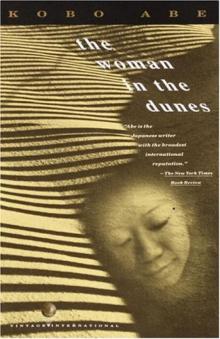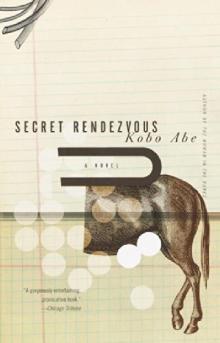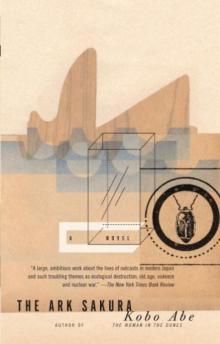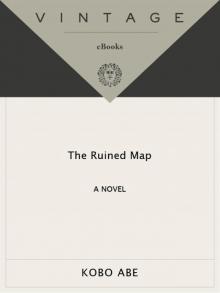The Ruined Map Read online
Page 3
The girl had stopped drinking halfway through her second glass. One by one the bubbles collapsed, the beer turning to dregs before my eyes. I didn’t stir. Was she deep in thought, was she angry, or was it absent-mindedness? Her lower lip protruded slightly, a lip like that of a still-nursing child. Because of that—at the angle at which her head was bent, the nostrils were barely visible—her nose had a certain impertinence.
“No, what would probably be more difficult to handle than such an organization would be a nobody. A worthless cigarette butt tossed away in the street. The fated accident, as it were. This happens to be a true story: a certain head of a branch bank, who was reputed to be especially conservative among his naturally conservative fellow bank employees, had arrived at the age of retirement. On the day he left work, he happened to go to see a nude show and was instantly infatuated with one of the girls. She was just one of the chorus line, nothing much in particular. She had the habit of constantly gnawing at her fingernails. Even while she was performing on the stage she was liable to keep on biting at them—perhaps she didn’t care. Anyway, she made a rather poor showing. However, the fact that she bit her nails seemed to please him privately. After going back to the place for three days, he wrote a fan letter. On the fourth day, things seemed to be going pretty well, and he thought he would take her out to dinner or something. Then, suddenly on the fifth day things took an unexpected turn—a sensational double suicide in the girl’s room. It was done with something like a safetyrazor blade. The harder they are the easier they break, you know.”
Not the slightest change was visible in the girl’s expression. The bubbles in her glass were rapidly fading away. Seen from the side, the surface of the foam made one think of the top of a jungle in an aerial photograph. What was she seeing? I wondered. Suddenly there was a swelling, like freshly painted enamel, along her lower eyelid. A tear perhaps? I was disconcerted. I hadn’t really meant it that way.
“But, let me say … about the paper clip … perhaps, as you claim, it is proof he was really thinking about the documents. But whether he intended to deliver them to S—– station or not, as he had in fact promised, is another question, I think. Of course, it also depends on the contents of the documents.”
“He said no one knew what the contents were.”
Her answer had come back effortlessly, like a ball rebounding with its own momentum, but the tone of her voice did not differ in the slightest from before she had fallen silent.
“But was it company business?”
“It certainly wasn’t very important, I know.”
“I need the truth, not a conjecture like that. Now, about the documents … tomorrow I’ll go and investigate at the company. But I really don’t understand. You yourself claim to have no clues. Yet the fact that not a single concrete item was left—no diary, calling cards, or address book—is incomprehensible, since he was a most orderly man. There’s some contradiction here. You, his wife, have no clues, so you apparently want to believe that his disappearance was accidental. But aren’t the facts rather the opposite? ‘Flying birds leave no tracks’ would seem to fit the case somewhat better, I should think.”
“But there’s the clip. And then he absolutely didn’t touch the savings book.”
“Clip, clip, clip … If I may say so, how can you positively claim it wasn’t a feint in order to convince you? You can’t, can you? And then, maybe he was trying to say goodbye to you for the last time.”
“Certainly not. All the time I was looking for the clip he kept whistling in a funny way as he brushed his shoes.”
“Funny?”
“It was some television commercial, I guess.”
“Come, come, now. You’re welcome to pull the wool over your own eyes, but it serves no purpose to hoodwink me.”
“Well, then, maybe there was something. Maybe a book for addresses and phone numbers …”
For the first time she turned in confusion toward the corner of the room where the telephone was located, and just as she was on the verge of biting her thumbnail, she pressed her hand which she had doubled hastily into a fist against her lips. It was no use to hide it. Even though she fought against the habit, there was a white scar along the edge of the nail, on which the polish had been applied especially thick. She smiled apologetically.
“There was an address book, wasn’t there?”
“Now that you speak of it, I guess there was. When you slid the button to the initial and pressed the cover it opened up. It was black enamel … about this big. If I remember right, it was always on that shelf.”
“Did it disappear along with your husband?”
“No. If it was taken, then it was my brother who took it. He couldn’t just let me wait around and do nothing. He looked and looked, but there wasn’t a single entry of any use. I wonder if he just didn’t put it away and forget it. If a thing like that were where it would always catch my eye, even I would have had to do something. My brother was against my doing anything so dangerous.”
“Dangerous?”
“He says a single map for life is all you need. It’s a saying of his. The world is a forest, a woods, full of wild beasts and poisonous insects. You should go only through places where everyone goes, places that are considered absolutely safe, he says.”
“It’s rather like saying one should disinfect the soap before washing one’s hands.”
“Yes. It is. Really, my brother’s that kind of person. Even when he comes home he spends forever washing his hands, gargling, and things like that.”
“Well, would you please try getting him on the phone for me now.”
Suddenly a gray shadow masked the girl’s expression. No, a curtain rose. Perhaps it was the real color of her skin that was coming out. For the first time she focused her eyes. As she gently felt along the edge of the table with the aligned fingertips of both hands, she stood up soundlessly and passed round in back of the narrow chair, making a shallow billow in the lemon-yellow curtains. She was a girl that black suited. A slender waist that defied gravity. Taking up the receiver, she dialed without consulting an address book, and, using the same finger she had used for dialing, she pinched a pleat in the curtain. A slender finger that seemed quite without articulations. She was apparently in the habit of pinching anything—perhaps some newly formed propensity to avoid biting her nails. The pinched curtain moved gently. I wondered if she weren’t a little drunk. But black and yellow were signs of “Danger, beware!”
“It’s true,” she murmured in a low, rasping voice, as if she were beginning to talk to someone in front of her. “I’m always too inclined to let things take care of themselves by talking to myself. Of course, the best thing is to hear directly from the person in question. Even I couldn’t believe it at once … just after that casual whistling … he said he rather had the feeling my brother was surprised. Hmm … strange, isn’t it … no one answers … could he be out? I wonder.”
“Where are you phoning to?”
“To someone who lives in the back of the house.”
“A last eyewitness? Oh, let it go. Surely, he’s already sick of your telephone calls. Anyway, that’s not the telephoning I’m asking for.”
Surprised, she replaced the receiver on its hook as if she were holding a caterpillar.
“Well, then, where should I call?”
“To your brother, of course.”
“That’s impossible. Because …”
“As for me, I need maps, ten or twenty of them. What in heaven’s name do you expect me to do with an old matchbox and a photograph like this? I’m different from you; it’s my business to go around snooping in dangerous places. It’s written right here in the request application I showed you. I don’t think it’s at all unreasonable of me to ask you to provide any and all evidence you can.”
“My brother knows there’s nothing of any use. He’s done some investigating on his own.”
“He’s got a lot of confidence. For god’s sake, why did you hire me then?”
“Because I couldn’t stand waiting any longer.”
Of course, it was hard to wait. Even so, I would keep on waiting. Slowly I walked along, paused, turned around, and walked back again. At intervals, a bus pulled up and stopped. Then came the straggling sounds of footsteps … invisible figures. It was not only the figures I did not see, I also could not distinguish a single trace of anything resembling a fault, a fissure, a magic circle, a secret subway entrance. There was only the black and empty perspective I had grown weary of waiting for. That, and the biting wind of a February night.
To say nothing of seven thirty of an early morning, that most cheerless of all hours … an hour like distilled water when nothing strange ever happens. What in heaven’s name could be the worst imaginable mishap in the life of a section head for a fuel wholesaler? They had tried to make a fool of me, or maybe I had chanced on a half-witted client. It made no difference which; in either case, invisible was invisible. There was no reason why one should be able to see, nor did I intend to look.
Something I wanted to see was already visible. I would continue to concentrate on the single point I could see. That faint rectangle of light … the lemon-yellow window … the window of the room I had taken leave of only a moment ago. The lemon-yellow curtains mocked me derisively—I who was frozen in the dark, who, for her sake, resolutely held in check the invasion of darkness. Yet, one way or another, I was the one who would betray her. I would wait. I would keep on waiting until then.
The sound of footsteps, as if someone were walking only on heels, drew hurriedly near, and for the first time I diverted my eyes from the lemon-yellow window. The clippity-clop of high heels of someone late … a woman’s timid footsteps. Even the darkness could not hide the white coat, furtrimmed at the collar and cuffs, and a paper sack carried under her arm. She pretended to take no notice of me, but she could not fool me; the upper half of her body facing me was still, armor-like. How would it be if, suddenly, I were to drag her over and throw her down on the grass? She would fall easily, without a sound, like a stone statue—and, of course, pretend to lose consciousness. Since the white coat would be too conspicuous, perhaps I should sprinkle some dry grass over her … a motionless girl buried under dead grass. Under the grass, she would quickly slip out of her clothes—naked. Only her arms and legs, projecting from the grass, would be uncovered. The wind would blow, carrying away the grass around her face … and then the face would suddenly change into that of the woman on the other side of the lemon-yellow curtains. A still stronger wind would arise and scatter the remaining grass. But instead of the naked body that I expected, only a black hole would appear. The white-coated silhouette of the girl turned directly under the street light, swelling out before my eyes, and then vanishing into the darkness. Her arms and legs disappeared too, and only the hole, like a bottomless well, was left.
She seemed to be wearing frozen fish bladders for shoes. But I would wait another half hour. If my expectations were justified—and I could only assume they were—the silhouette of the girl leaning over beyond the curtains would surely appear. This was a different situation from the one of the girl under the grass. The choice was not mine but hers.
I had verified this before: when she had tried telephoning, there was only one posture she could take, since the chair was in her way. By the window, facing sideways, the very top of her head seemed cut off against the light. The curtain material was rather heavy, but the weave was coarse and it was practically certain that a shadow would show through. If only I could catch her telephoning I would not have waited in vain, frozen as I was. The person on the phone was decidedly a curious fellow, someone she called “brother.” A strange one, who, she said, was kind, clever, self-sacrificing, and who, because of a profound philosophy of life, had no permanent address. He had acted on behalf of the applicant, yet at the crucial moment he was leaving negotiations in the hands of a woman in the early stages of alcoholism, drowning in her own monologues, rolling in laughter, tickled by a phantom husband, dreaming a nightmare with her eyes wide open. He was an irresponsible adviser who did not even show his face.
No, it made no difference. I had absolutely no intention of poking and prying into the right and wrong of my client’s words. This was business, and so as long as I got my fee, I would work seriously even if I was dealing with a lie. But if I didn’t more or less grasp the outlines of the plot, I couldn’t play the role of dunce very well. Rather, the more stupid the character the more difficult the situation. And there was also the business of self-respect. A stupid impersonation was fine, but I couldn’t stand being treated as stupid from the beginning. Since the fee was thirty thousand yen, I would go that far but no further.
Putting my briefcase at my feet, I rubbed my sides with both hands through my coat pockets, all the time keeping my eyes on the lemon-yellow curtains. A taxi, chugging up the hill, gears screaming to the breaking point, stripped away the darkness and plunged deep into the precincts of the housing project. I would wait at least until the taxi returned. But supposing her shadow didn’t appear as I expected? Impossible—it must. The existence of this “brother” was most questionable. It is a lot easier and more natural to put a puzzle ring back together than to take it apart.
Somewhere, far away, the sound of a roughly closed iron door struck my ears like a sigh from the earth, reverberating back and forth through buried pipes. The feeble howling of a dog rent the air. I wanted to urinate. Involuntarily, my body began to tremble. I had apparently come to the end of my endurance. I thought that the snow had begun to sparkle, but it was manifestly an illusion from having strained my eyes too much in the darkness. Even when I shut my eyes, the snow kept falling behind my closed lids. But what was harder to believe than the snow was …
The taxi came back with the For Hire light on. What was so difficult to believe? Filled with unbelievable things, I no longer knew what I was trying to be suspicious of. My mental faculties seemed to be numb. The lemon-yellow curtains showed no change. A glass bead in the mouth when I wanted a piece of candy. Well, I was lucky I hadn’t munched on it. I shuddered as I finished urinating, picked up my briefcase, and returned to the car. The engine sputtered and groaned. If things had gone as I had anticipated the sound of the motor would have announced my triumph to her, but now it was simply irksome and depressing. Well, if she maintained what she said to be the truth, there was nothing to do but begin with that truth.
A photograph and a worn-out matchbox with advertising. There were too many blank spaces on the map. Therefore, I had no obligation to force myself to fill them in. I was no guardian of the law.
REPORT
12 February: 9:40 A.M.—I investigated the origin of the matchbox. About twenty minutes by foot from the client’s house, I faced in the direction of S—– station on the main road, and looking to the right at the subway station at the bottom of the hill below the housing project, I saw on the left an open-air parking lot. Immediately diagonally in front, I could see a sign bearing the word “Camellia,” just like the name on the matchbox. A very ordinary coffee house: capacity about eighteen seats. Besides the owner, there was one waitress … about twenty-two, more or less … fattish, with a round face and small eyes … traces of pimples on her forehead. She had a liking for showy things and wore patterned stockings, but she was an unattractive girl. She is doubtless outside the scope of this investigation. On the door there was a sign “Girl Wanted,” and I imagined that someone must have quit recently. I inquired directly of the proprietor, but it was not that. They simply needed a new girl. They had no reaction to the picture of the missing man, no special comment; at least both agreed in testifying that he had not been a regular customer. (N.B. eighty yen for coffee.)
THIS MORNING I was hung over. So, though I usually drink two cups of coffee, I decided to let it goat one.
There was no intentional negligence in my report concerning the Camellia coffee house. The damaged condition of the matchbox, the worn label, the close yet inconveni
ent location of the coffee house itself—all coincided very well with the proprietor’s statement that Nemuro had not been a regular customer. What more could I add?
The tired old walls with traces of former shelving had been left just as they were. Fastened on one wall was a color print of a coffee plantation, maybe in South America. Dust had gathered on the turned-up corners. The person who put it up would certainly not remember that there ever had been such a picture. And yet, in it everyone was wearing widebrimmed straw hats—if you stood in front of it the sun seemed to be shining brilliantly. But from over here, where the bleak dregs of the February day lay stagnant on the other side of the meshed curtain, there was only the red flame of the kerosene stove, smoking away under a faded rubber tree. Furthermore, I was the only customer the whole time I was there. The sour-looking girl stayed bent over a weekly magazine beside the counter, and the proprietor, too, with a puffy face, as if he had a head cold, went around sluggishly wiping off the tables. Every time he finished a table, he would raise his eyes and look over those he had done and heave a long, reproachful sigh. If I must add something else, I suppose it would be the remark: Dead End. Anything more would be as ridiculous as searching the print of the coffee plantation with a magnifying glass. Not only Nemuro but also anyone else walking into this place would at once be struck with the thought of how fortunate he was to have a home to go back to. Under any circumstances there were no untruths in my report.

 The Box Man
The Box Man Beasts Head for Home
Beasts Head for Home The Face of Another
The Face of Another The Woman in the Dunes
The Woman in the Dunes Secret Rendezvous
Secret Rendezvous The Ark Sakura
The Ark Sakura The Ruined Map
The Ruined Map